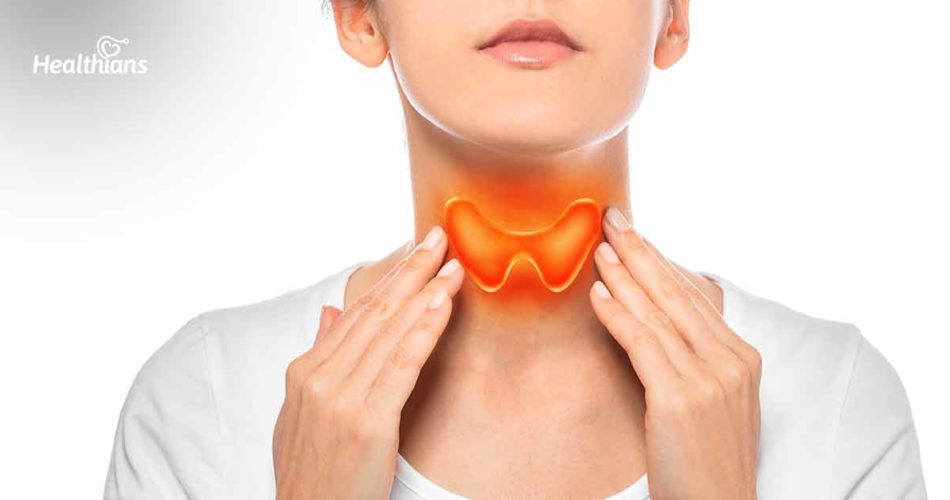Contributed by: Healthians Team
What is the thyroid gland?
Ever wondered how the body’s metabolism is regulated or which gland helps in the proper physiological development of the body?
And most importantly, how are the blood pressure, body temperature, and heart rate maintained?
These important responsibilities are carried on by a butterfly-shaped gland present at the front of the neck, called the thyroid gland. The thyroid gland also aids several other bodily functions, such as:
- Managing bodyweight
- Improving muscle strength
- Regulating breathing
- Protecting bone loss
- Maintaining blood lipid levels
- Healthy menstrual cycle
- Regulating the central nervous system (CNS)
- Controlling energy expenditure
If the functioning of the thyroid gland is compromised, it can give rise to two types of conditions, namely:
- Hyperthyroidism
When the thyroid gland begins to secrete more than the required amount of thyroid hormones.
- Hypothyroidism
Also called underactive thyroid disorder, hypothyroidism is a condition in which the production of thyroid hormones drops and slows down the metabolism.
It can even increase the risk of cardiovascular ailments, osteoporosis, and can even cause infertility.
Continuation
Some studies suggest that excessive stress can also trigger hypothyroidism. When under stress, the adrenaline gland releases a hormone called cortisol, which can potentially suppress the functioning of the pituitary gland, thus hindering the production of thyroid-stimulating hormones (TSH).
The symptoms of hypothyroidism are very common and similar to certain physically discomforting issues that usually occur in the day to day life.
Thus, these symptoms are often neglected and the disease goes undetected, leading to severe health complications in the future.
Continue reading to learn about the five lesser-known signs of hypothyroidism and some precautionary measures that can be taken to prevent the aggravation of this condition, if already affected.
Headaches
Headaches are normal for everyone. They can occur due to various reasons such as excessive alcohol intake, changes in routine, stress, and weather changes. Some people can experience headaches due to loud noise, depression, or poor posture. Additionally, headaches can also occur due to an underactive thyroid gland.
According to studies, around 30% of people who have hypothyroidism experience headaches. This happens when the blood circulation to the brain slows down, giving rise to migraine.
But it’s still unclear whether hypothyroidism is the cause or not. Furthermore, hypothyroidism does lead to fatigue, which can trigger migraine headaches.
Digestive issues & heartburn
When the thyroid gland is unable to secrete enough thyroid hormone into the bloodstream, the movement of food through the digestive tract slows down and may lead to bloating or constipation. Hypothyroidism can also slow down the metabolism and contribute to unintentional weight gain.
Compromised digestion can give rise to acid reflux in the stomach and cause heartburn and food insensitivity.
Dry skin & sensitivity to cold
Are you experiencing skin dryness, thickening, scaling, and excessive itching? Or is it difficult for you to tolerate cold even when you’re wearing sufficient warm clothes?
Well, it may be the signs of an underactive thyroid gland and it’s time for you to seek medical attention as soon as possible.
Hypothyroidism can cause changes in the skin from head (dry and flaky scalp) to toe (dry and cracked feet).
The condition can also increase sensitivity to cold due to reduced blood circulation and slow metabolism, frequently making the hands and feet cold.
Menstrual irregularities & fertility issues
If hypothyroidism goes untreated for a prolonged time, it can give rise to menstrual irregularities such as:
- More than seven days of bleeding
- The necessity to use more than one pad at a time to control the flow
- Need to change the pad at night
- Menstrual flow with blood clots
Before we understand how hypothyroidism can cause fertility issues, let us first understand what luteinizing hormone (LH) levels are.
In simple terms, LH levels help in regulating the healthy menstrual cycle and egg production.
The underactive thyroid gland can cause irregularities in the LH levels which can affect ovulation, thus, making pregnancy difficult. Therefore, the healthy functioning of the thyroid gland is essential for fertility and pregnancy.
FYI
Apart from these lesser-known signs, some common symptoms of hypothyroidism include:
- Fatigue
- Unintentional weight gain
- Decreased sweating
- Puffy or sensitive face
- Muscle weakness and stiffness
- Joints pain
- Throat tightness
- Hoarseness
- Increased blood cholesterol levels
- Slowed heart rate
Tips to prevent aggravated hypothyroidism
Preventing the onset of hypothyroidism may not be in your control, but you can always take measures to prevent the aggravation of the condition and live a healthy life. Here are the five essential tips to help you:
- Take medicines on time
- Quit smoking
- Exercising can help in getting rid of those extra kilos while boosting metabolism
- If you take any supplements, ask your doctor for the right time and amount to have them
Ask your doctor
| When to get tested for thyroid hormone levels | Which food and supplements can worsen your condition and which are the best |
| Dietary changes that can help in managing the condition | Possible side effects of thyroid medications and how to mitigate them |
Final thoughts
Hypothyroidism is a serious condition that can even become life-threatening if left untreated. But the ray of hope is that the condition is treatable with proper medical interventions and dietary/lifestyle changes.
If you experience the above-mentioned symptoms and are worried that it might be due to an underactive thyroid gland, consult your doctor as soon as possible, and take measures to prevent the aggravation of the condition (if already diagnosed).
Another step towards a healthy you is taking regular diagnoses to keep an eye on your thyroid levels.
These health checks can help you in ascertaining the levels of thyroid in the body, and allow you to take preventive measures and stay at the top of your health.




